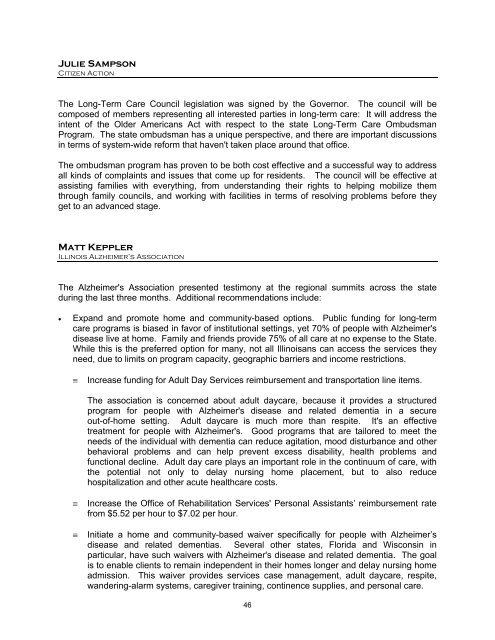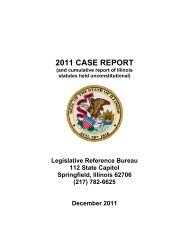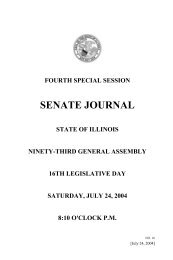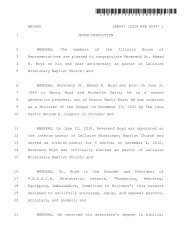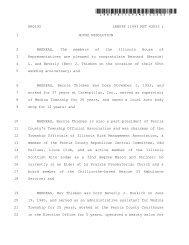Long-Term Care - Illinois General Assembly
Long-Term Care - Illinois General Assembly
Long-Term Care - Illinois General Assembly
Create successful ePaper yourself
Turn your PDF publications into a flip-book with our unique Google optimized e-Paper software.
Julie Sampson<br />
Citizen Action<br />
The <strong>Long</strong>-<strong>Term</strong> <strong>Care</strong> Council legislation was signed by the Governor. The council will be<br />
composed of members representing all interested parties in long-term care: It will address the<br />
intent of the Older Americans Act with respect to the state <strong>Long</strong>-<strong>Term</strong> <strong>Care</strong> Ombudsman<br />
Program. The state ombudsman has a unique perspective, and there are important discussions<br />
in terms of system-wide reform that haven't taken place around that office.<br />
The ombudsman program has proven to be both cost effective and a successful way to address<br />
all kinds of complaints and issues that come up for residents. The council will be effective at<br />
assisting families with everything, from understanding their rights to helping mobilize them<br />
through family councils, and working with facilities in terms of resolving problems before they<br />
get to an advanced stage.<br />
Matt Keppler<br />
<strong>Illinois</strong> Alzheimer’s Association<br />
The Alzheimer's Association presented testimony at the regional summits across the state<br />
during the last three months. Additional recommendations include:<br />
• Expand and promote home and community-based options. Public funding for long-term<br />
care programs is biased in favor of institutional settings, yet 70% of people with Alzheimer's<br />
disease live at home. Family and friends provide 75% of all care at no expense to the State.<br />
While this is the preferred option for many, not all <strong>Illinois</strong>ans can access the services they<br />
need, due to limits on program capacity, geographic barriers and income restrictions.<br />
≡<br />
Increase funding for Adult Day Services reimbursement and transportation line items.<br />
The association is concerned about adult daycare, because it provides a structured<br />
program for people with Alzheimer's disease and related dementia in a secure<br />
out-of-home setting. Adult daycare is much more than respite. It's an effective<br />
treatment for people with Alzheimer's. Good programs that are tailored to meet the<br />
needs of the individual with dementia can reduce agitation, mood disturbance and other<br />
behavioral problems and can help prevent excess disability, health problems and<br />
functional decline. Adult day care plays an important role in the continuum of care, with<br />
the potential not only to delay nursing home placement, but to also reduce<br />
hospitalization and other acute healthcare costs.<br />
≡ Increase the Office of Rehabilitation Services' Personal Assistants’ reimbursement rate<br />
from $5.52 per hour to $7.02 per hour.<br />
≡ Initiate a home and community-based waiver specifically for people with Alzheimer’s<br />
disease and related dementias. Several other states, Florida and Wisconsin in<br />
particular, have such waivers with Alzheimer's disease and related dementia. The goal<br />
is to enable clients to remain independent in their homes longer and delay nursing home<br />
admission. This waiver provides services case management, adult daycare, respite,<br />
wandering-alarm systems, caregiver training, continence supplies, and personal care.<br />
46


